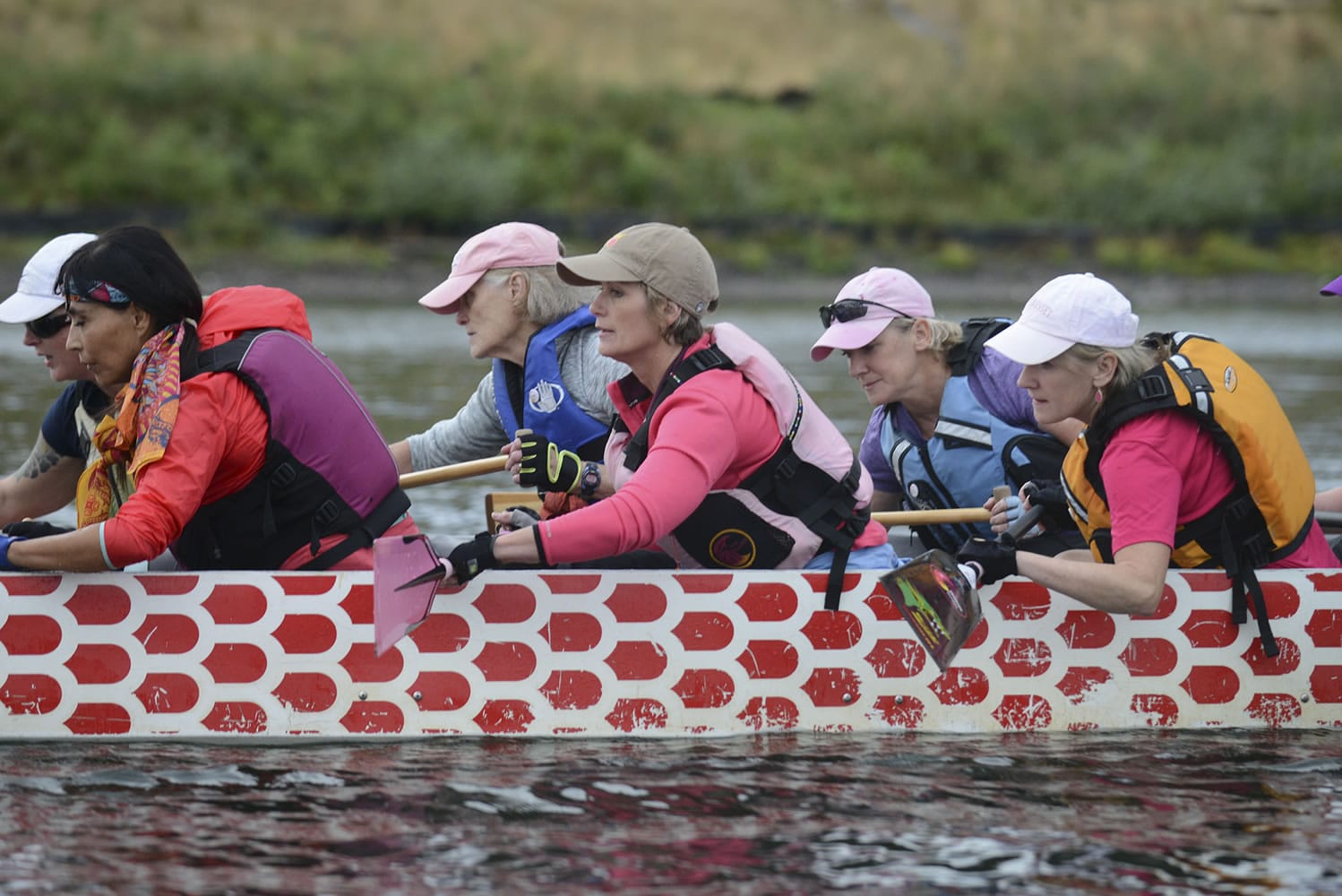Mary Sullivan and Meg Perlick have shared a lot over the years.
As identical twins, they share looks and birthdays. They share weekly family dinners and a love for sports, especially running and dragon boat paddling. They share stories and jokes and finish each other’s sentences.
“We’re not connected,” Meg said.
“But we kinda are,” Mary added.
There’s another thing the Vancouver women share that they hoped they never would: breast cancer diagnoses. First Mary, in July 2010. Then, one year later, Meg.
“Meg and I have shared a lot,” Mary said. “We’ve been together our whole lives.”
“We didn’t have to share this,” Meg added.
Double diagnoses
In late June 2010, Mary was showering when she noticed a lump in her right breast.
Mary, then 44, underwent a biopsy that confirmed she had Stage 3 breast cancer. The tumor ended up being bigger than anyone expected, and the cancer had spread into Mary’s lymph nodes.
“My cancer was pretty aggressive,” Mary said.
So, her treatment was equally aggressive.
Mary underwent a mastectomy of her right breast. Surgery was followed by two months of chemotherapy, with treatment every two weeks, and 10 weeks of daily radiation. Mary’s cancer was herceptin positive — meaning it had a protein that promotes the growth of cancer cells — which required a year of medication to combat.
After Mary’s breast cancer diagnosis, somebody suggested Meg get checked for cancer.
“It never crossed my mind that we’re identical twins, and I should get checked,” Meg said.
Meg, then 45, didn’t feel any lumps in her breasts but decided to get checked. In August 2011, Meg learned she had breast cancer.
Meg had a lumpectomy, but her surgeon found another tumor, requiring a second lumpectomy. The margins around the tumors kept coming back positive for cancer cells, so Meg ultimately underwent a mastectomy of her left breast.
Meg began chemotherapy treatment, just as Mary did, but one week into the treatment, Meg suffered a life-threatening reaction to the drug.
She was in severe pain and rushed to the emergency room. One week later, Meg awoke from a coma in the hospital’s intensive care unit and discovered part of her colon had been removed.
Doctors said Meg’s colon was minutes from perforating. At one point, a nun was summoned to Meg’s hospital room to speak to her husband, to prepare him in case Meg didn’t pull through.
About two months after the hospital stay, Meg resumed chemotherapy — this time on a different drug and at a lower dose. Once she completed chemo, she underwent radiation.
Both women have checkups every six months, and will undergo an MRI and mammogram every year. They will also take a medication to counter their estrogen-receptive cancers for 10 years.
Double negative
Mary and Meg’s mother and grandmother both had breast cancer. They didn’t know much about their grandmother’s diagnosis, but breast cancer was one of four cancer diagnoses their mother received.
Still, “We never thought breast cancer ran in the family,” Mary said.
But after Meg received her diagnosis, she decided to undergo testing for the BRCA gene mutation. Women who inherit the genetic mutation face a much higher chance of developing breast and ovarian cancers. The women wanted to make sure the mutation didn’t run in the family since Mary has two daughters.
Meg tested negative. She — and, by default, her identical twin — didn’t have the mutation.
Since recovering from surgeries and completing their treatments, Mary and Meg have both resumed their healthy, active lifestyles. Mary found comfort in returning to her running routine as soon as possible after surgery and continued to run during chemotherapy treatment.
“I even ran when I had the drainage tubes,” she said. “It just made me normal.”
About 2 1/2 years ago, Mary and Meg, now 49, joined a Portland dragon boat team, Pink Phoenix, that consists entirely of breast cancer survivors. They practice with the team three days a week and compete in about eight events a year.
The team serves as a sort of support group, Mary said. All of the women share a similar, yet very different, experience: breast cancer. They understand each other without having to talk about cancer, she said.
“There are some inspiring stories on that team,” Mary said.
Mary and Meg hope their own stories can help others facing cancer diagnoses.
“We are living proof of hope,” Meg said. “There is light at the end of the tunnel, and you have to know that.”




